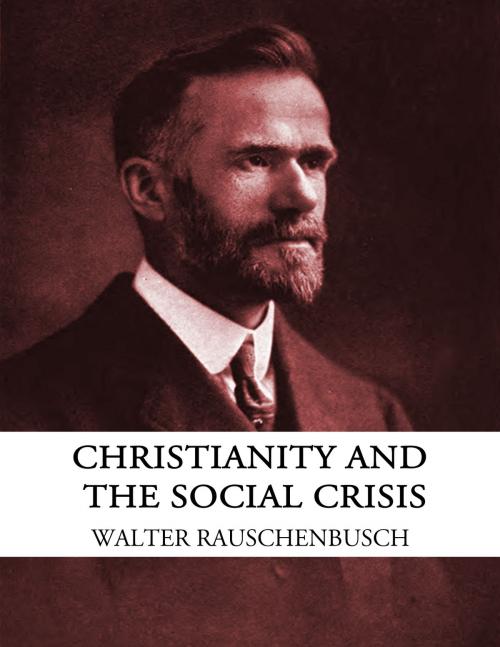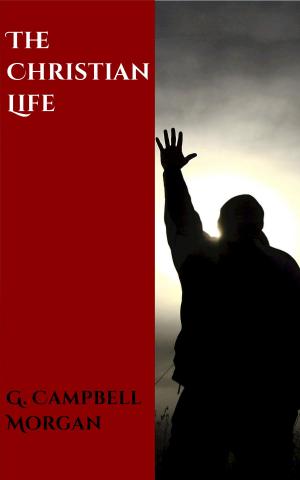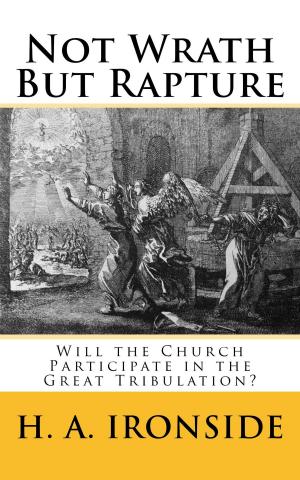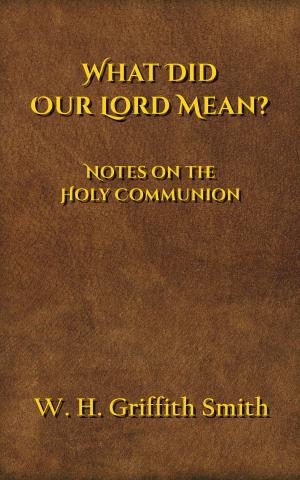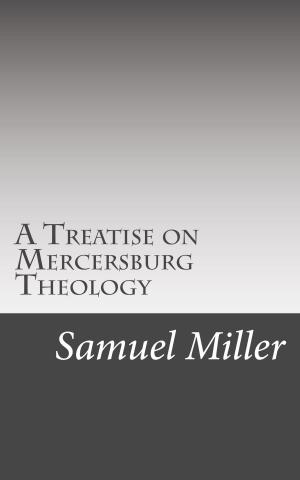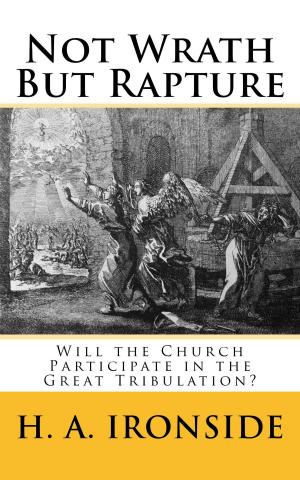Christianity and the Social Crisis
Nonfiction, Religion & Spirituality, Christianity, Missions & Missionary Work, Christian Literature, Christian Life| Author: | Walter Rauschenbusch | ISBN: | 1230002055305 |
| Publisher: | CrossReach Publications | Publication: | December 19, 2017 |
| Imprint: | Language: | English |
| Author: | Walter Rauschenbusch |
| ISBN: | 1230002055305 |
| Publisher: | CrossReach Publications |
| Publication: | December 19, 2017 |
| Imprint: | |
| Language: | English |
INTRODUCTION
Western civilization is passing through a social revolution unparalleled in history for scope and power. Its coming was inevitable. The religious, political, and intellectual revolutions of the past five centuries, which together created the modern world, necessarily had to culminate in an economic and social revolution such as is now upon us.
By universal consent, this social crisis is the overshadowing problem of our generation. The industrial and commercial life of the advanced nations are in the throes of it. In politics all issues and methods are undergoing upheaval and re-alignment as the social movement advances. In the world of thought all the young and serious minds are absorbed in the solution of the social problems. Even literature and art point like compass-needles to this magnetic pole of all our thought.
The social revolution has been slow in reaching our country. We have been exempt, not because we had solved the problems, but because we had not yet confronted them. We have now arrived, and all the characteristic conditions of American life will henceforth combine to make the social struggle here more intense than anywhere else. The vastness and the free sweep of our concentrated wealth on the one side, the independence, intelligence, moral vigor, and political power of the common people on the other side, promise a long-drawn grapple of contesting forces which may well make the heart of every American patriot sink within him.
It is realized by friend and foe that religion can play, and must play, a momentous part in this irrepressible conflict.
The Church, the organized expression of the religious life of the past, is one of the most potent institutions and forces in Western civilization. Its favor and moral influence are wooed by all parties. It cannot help throwing its immense weight on one side or the other. If it tries not to act, it thereby acts; and in any case its choice will be decisive for its own future.
Apart from the organized Church, the religious spirit is a factor of incalculable power in the making of history. In the idealistic spirits that lead and in the masses that follow, the religious spirit always intensifies thought, enlarges hope, unfetters daring, evokes the willingness to sacrifice, and gives coherence in the fight. Under the warm breath of religious faith, all social institutions become plastic. The religious spirit removes mountains and tramples on impossibilities. Unless the economic and intellectual factors are strongly reenforced by religious enthusiasm, the whole social movement may prove abortive, and the New Era may die before it comes to birth.
It follows that the relation between Christianity and the social crisis is one of the most pressing questions for all intelligent men who realize the power of religion, and most of all for the religious leaders of the people who give direction to the forces of religion.
The question has, in fact, been discussed frequently and earnestly, but it is plain to any thoughtful observer that the common mind of the Christian Church in America has not begun to arrive at any solid convictions or any permanent basis of action. The conscience of Christendom is halting and groping, perplexed by contradicting voices, still poorly informed on essential questions, justly reluctant to part with the treasured maxims of the past, and yet conscious of the imperious call of the future.
This book is to serve as a contribution to this discussion. Its first chapters are historical, for nothing is more needed than a true comprehension of past history if we are to forecast the future correctly and act wisely in the present. I have tried to set forth the religious development of the prophets of Israel, the life and teachings of Jesus, and the dominant tendencies of primitive Christianity, in order to ascertain what was the original and fundamental purpose of the great Christian movement in history. Every discussion of the question which appeals to history has to cover this ground, but usually only detached fragments of the material are handled at all, and often without insight adequate to give their true meaning even to these fragments. I am in hopes that these chapters will contribute some facts and points of view that have not yet become common property.
The outcome of these first historical chapters is that the essential purpose of Christianity was to transform human society into the kingdom of God by regenerating all human relations and reconstituting them in accordance with the will of God. The fourth chapter raises the question why the Christian Church has never undertaken to carry out this fundamental purpose of its existence. I have never met with any previous attempt to give a satisfactory historical explanation of this failure, and I regard this chapter as one of the most important in the book.
The fifth chapter sets forth the conditions which constitute the present social crisis and which imperatively demand of Christianity that contribution of moral and religious power which it was destined to furnish.
The sixth chapter points out that the Church, as such, has a stake in the social movement. The Church owns property, needs income, employs men, works on human material, and banks on its moral prestige. Its present efficiency and future standing are bound up for weal or woe with the social welfare of the people and with the outcome of the present struggle.
The last chapter suggests what contributions Christianity can make and in what main directions the religious spirit should exert its force.
In covering so vast a field of history and in touching on such a multitude of questions, error and incompleteness are certain, and the writer can claim only that he has tried to do honest work. Moreover, it is impossible to handle questions so vital to the economic, the social, and the moral standing of great and antagonistic classes of men, without jarring precious interests and convictions, and without giving men the choice between the bitterness of social repentance and the bitterness of moral resentment. I can frankly affirm that I have written with malice toward none and with charity for all. Even where I judge men to have done wrong, I find it easy to sympathize with them in the temptations which made the wrong almost inevitable, and in the points of view in which they intrench themselves to save their self-respect. I have tried—so far as erring human judgment permits—to lift the issues out of the plane of personal selfishness and hate, and to put them where the white light of the just and pitying spirit of Jesus can play upon them. If I have failed in that effort, it is my sin. If others in reading fail to respond in the same spirit, it is their sin. In a few years all our restless and angry hearts will be quiet in death, but those who come after us will live in the world which our sins have blighted or which our love of right has redeemed. Let us do our thinking on these great questions, not with our eyes fixed on our bank account, but with a wise outlook on the fields of the future and with the consciousness that the spirit of the Eternal is seeking to distil from our lives some essence of righteousness before they pass away.
I have written this book to discharge a debt. For eleven years I was pastor among the working people on the West Side of New York City. I shared their life as well as I then knew, and used up the early strength of my life in their service. In recent years my work has been turned into other channels, but I have never ceased to feel that I owe help to the plain people who were my friends. If this book in some far-off way helps to ease the pressure that bears them down and increases the forces that bear them up, I shall meet the Master of my life with better confidence.
INTRODUCTION
Western civilization is passing through a social revolution unparalleled in history for scope and power. Its coming was inevitable. The religious, political, and intellectual revolutions of the past five centuries, which together created the modern world, necessarily had to culminate in an economic and social revolution such as is now upon us.
By universal consent, this social crisis is the overshadowing problem of our generation. The industrial and commercial life of the advanced nations are in the throes of it. In politics all issues and methods are undergoing upheaval and re-alignment as the social movement advances. In the world of thought all the young and serious minds are absorbed in the solution of the social problems. Even literature and art point like compass-needles to this magnetic pole of all our thought.
The social revolution has been slow in reaching our country. We have been exempt, not because we had solved the problems, but because we had not yet confronted them. We have now arrived, and all the characteristic conditions of American life will henceforth combine to make the social struggle here more intense than anywhere else. The vastness and the free sweep of our concentrated wealth on the one side, the independence, intelligence, moral vigor, and political power of the common people on the other side, promise a long-drawn grapple of contesting forces which may well make the heart of every American patriot sink within him.
It is realized by friend and foe that religion can play, and must play, a momentous part in this irrepressible conflict.
The Church, the organized expression of the religious life of the past, is one of the most potent institutions and forces in Western civilization. Its favor and moral influence are wooed by all parties. It cannot help throwing its immense weight on one side or the other. If it tries not to act, it thereby acts; and in any case its choice will be decisive for its own future.
Apart from the organized Church, the religious spirit is a factor of incalculable power in the making of history. In the idealistic spirits that lead and in the masses that follow, the religious spirit always intensifies thought, enlarges hope, unfetters daring, evokes the willingness to sacrifice, and gives coherence in the fight. Under the warm breath of religious faith, all social institutions become plastic. The religious spirit removes mountains and tramples on impossibilities. Unless the economic and intellectual factors are strongly reenforced by religious enthusiasm, the whole social movement may prove abortive, and the New Era may die before it comes to birth.
It follows that the relation between Christianity and the social crisis is one of the most pressing questions for all intelligent men who realize the power of religion, and most of all for the religious leaders of the people who give direction to the forces of religion.
The question has, in fact, been discussed frequently and earnestly, but it is plain to any thoughtful observer that the common mind of the Christian Church in America has not begun to arrive at any solid convictions or any permanent basis of action. The conscience of Christendom is halting and groping, perplexed by contradicting voices, still poorly informed on essential questions, justly reluctant to part with the treasured maxims of the past, and yet conscious of the imperious call of the future.
This book is to serve as a contribution to this discussion. Its first chapters are historical, for nothing is more needed than a true comprehension of past history if we are to forecast the future correctly and act wisely in the present. I have tried to set forth the religious development of the prophets of Israel, the life and teachings of Jesus, and the dominant tendencies of primitive Christianity, in order to ascertain what was the original and fundamental purpose of the great Christian movement in history. Every discussion of the question which appeals to history has to cover this ground, but usually only detached fragments of the material are handled at all, and often without insight adequate to give their true meaning even to these fragments. I am in hopes that these chapters will contribute some facts and points of view that have not yet become common property.
The outcome of these first historical chapters is that the essential purpose of Christianity was to transform human society into the kingdom of God by regenerating all human relations and reconstituting them in accordance with the will of God. The fourth chapter raises the question why the Christian Church has never undertaken to carry out this fundamental purpose of its existence. I have never met with any previous attempt to give a satisfactory historical explanation of this failure, and I regard this chapter as one of the most important in the book.
The fifth chapter sets forth the conditions which constitute the present social crisis and which imperatively demand of Christianity that contribution of moral and religious power which it was destined to furnish.
The sixth chapter points out that the Church, as such, has a stake in the social movement. The Church owns property, needs income, employs men, works on human material, and banks on its moral prestige. Its present efficiency and future standing are bound up for weal or woe with the social welfare of the people and with the outcome of the present struggle.
The last chapter suggests what contributions Christianity can make and in what main directions the religious spirit should exert its force.
In covering so vast a field of history and in touching on such a multitude of questions, error and incompleteness are certain, and the writer can claim only that he has tried to do honest work. Moreover, it is impossible to handle questions so vital to the economic, the social, and the moral standing of great and antagonistic classes of men, without jarring precious interests and convictions, and without giving men the choice between the bitterness of social repentance and the bitterness of moral resentment. I can frankly affirm that I have written with malice toward none and with charity for all. Even where I judge men to have done wrong, I find it easy to sympathize with them in the temptations which made the wrong almost inevitable, and in the points of view in which they intrench themselves to save their self-respect. I have tried—so far as erring human judgment permits—to lift the issues out of the plane of personal selfishness and hate, and to put them where the white light of the just and pitying spirit of Jesus can play upon them. If I have failed in that effort, it is my sin. If others in reading fail to respond in the same spirit, it is their sin. In a few years all our restless and angry hearts will be quiet in death, but those who come after us will live in the world which our sins have blighted or which our love of right has redeemed. Let us do our thinking on these great questions, not with our eyes fixed on our bank account, but with a wise outlook on the fields of the future and with the consciousness that the spirit of the Eternal is seeking to distil from our lives some essence of righteousness before they pass away.
I have written this book to discharge a debt. For eleven years I was pastor among the working people on the West Side of New York City. I shared their life as well as I then knew, and used up the early strength of my life in their service. In recent years my work has been turned into other channels, but I have never ceased to feel that I owe help to the plain people who were my friends. If this book in some far-off way helps to ease the pressure that bears them down and increases the forces that bear them up, I shall meet the Master of my life with better confidence.
